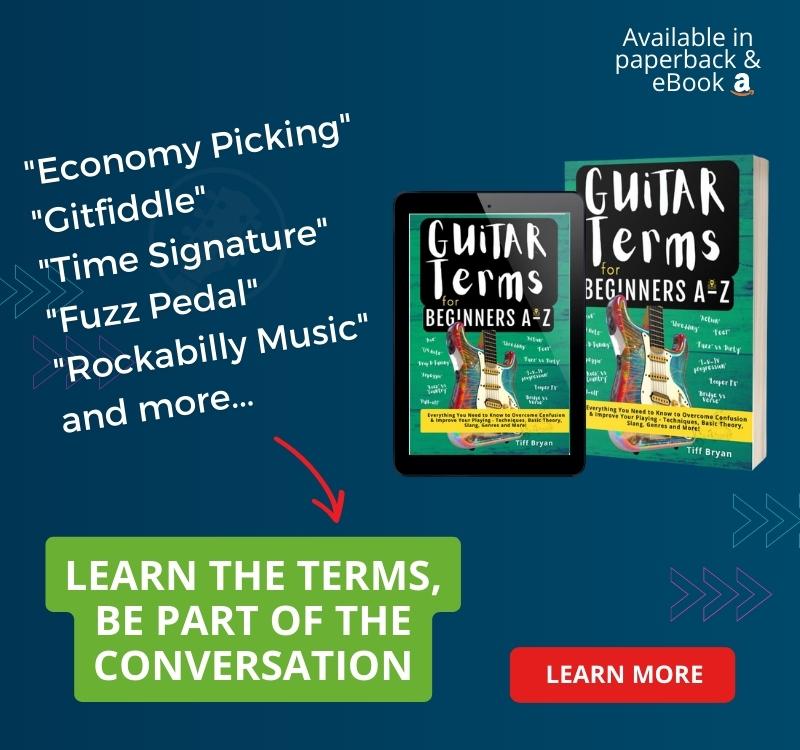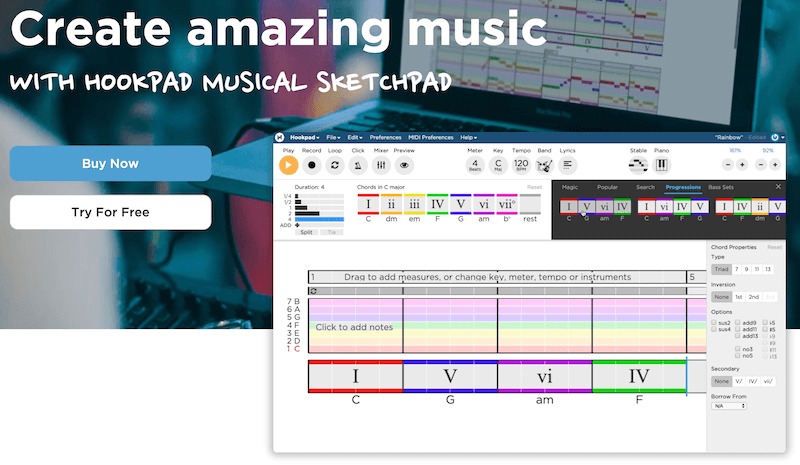Beginner and experienced guitarists: Discover how psychology can help you achieve your guitar goals faster and easier without hours of mindless practice.
Do you feel stuck in a rut with your guitar playing?
Do you want some fresh ideas that will make you a better guitarist?
If you answered yes, then this article is for you.
In this article, you will discover 10 amazing psychology facts that will change how you play guitar. You will also learn how to use these facts to improve your skills, confidence, and enjoyment of playing guitar.
So, if you’re curious about how your mind works and how it affects your guitar playing, keep reading.
By the end of this article, you will know 10 secrets that will make you a guitar master.
1. Your Brain Mirrors What You See

The Facts:
Back in the 1990s, scientists discovered curious little guys called Mirror Neurons. These are types of brain cells and are believed to explain why we learn skills by watching others.
The long and short of it is; ‘monkey see, monkey do’.
Here is a fascinating experiment to try where you can see mirror neurons working up close and personal with yourself and a friend as the guinea pigs:
Action Exercise
Pick something you know more about than one of your friends.
Take how you hold a plectrum and pick a guitar for example. Pick on an air guitar as you explain to them how you do it. Really go for it.
Guitar face is optional.
Watch your friends’ body language. The chance is without knowing they are doing it; they will start to copy your hand movements.
Say hello to those Mirror Neurons.
Make This Work for You:
It’s proved that when you play guitar you use multiple regions in your brain, from the motor cortex, to the visual cortex, to the audio. It’s busier than an elf on Christmas Eve.
Well, it’s now time to let your premotor cortex take centre stage because this area of the brain is where your mirror neurons live.
How do you do this? It’s a piece of cake…
Mimic the actions of any skilled guitar player around you. Doing this will help your guitar playing progress tenfold.
Food for thought: All great guitar players have both excellent listening and observation skills. The choice is yours.
Join the elite club and start watching and copying. If you do, your playing gains will be huge.
2. The Myth of Multi-Tasking
Imagine this scenario. You’re driving home, and your phone rings. You answer it with your Bluetooth and hear an old friend’s voice. You haven’t talked to them for ages, and they want to catch up.
You chat for half an hour, and then you say goodbye and promise to meet for a drink soon. Suddenly, you realize you’re almost home.
How did that happen?
It happens because your brain can only focus on one thing at a time. You can’t really multi-task, no matter how hard you try.
Multi-tasking is a myth.
What you can do is switch between different tasks quickly. But that’s not the same as doing them all at once.
Productivity expert David Crenshaw says that multi-tasking has three major drawbacks:
1. Tasks Take Longer: When you switch back and forth between tasks, each one ends up taking more time than if you tackled them individually.
2. Mistakes Multiply: The more plates you try to spin, the higher the chances of dropping a few. Mistakes become your unwelcome companions.
3. Stress Skyrockets: Picture this: deadlines looming, emails pinging, and your boss on the phone. The stress levels rise faster than a helium balloon at a kid’s birthday party.
Make This Work for You
If you want to play guitar better and faster, you need to stop multi-tasking. Yes, you read that right. Stop trying to do everything at once when you practice.
The first step is to use a custom-made practice planner. This will help you focus on a few specific skills per practice session. Using this smart tool will improve your guitar playing more quickly.
Did you know that 95% of guitar learners who said they’ve hit a frustrating plateau admitted they’ve never used a practice planner?
A guitar practice schedule is your secret weapon to avoid overloading your practice session with too many things.
3. Why We Love What We Know
The Facts:
Picture this: you’re driving along, minding your own business, when that one song comes on the radio. You know, the one that used to make you cringe.
But here’s the twist. By day four, it doesn’t grate on your nerves as much. And by day seven, you’re secretly bopping your head to its rhythm. What in the world is going on here?
Welcome to the effects of Mere Exposure Theory.
It’s the magical reason why things you once despised become your new favourites. Whether it’s a person, an activity, or that annoying radio earworm, the more you’re exposed to it, the more you fall under its enchantment.
Psychologists say it’s like a love potion for your brain.
Make this Work for You:
Now, here’s where it gets interesting. You’ve probably heard the old adage, “practice makes perfect,” right?
Well, let’s kick it up a notch. I’ve always shared this secret sauce with my guitar students:
“Perfect repeated practice makes perfect.”
It’s like a musical incantation that makes you a guitar wizard.
Next time you pick up your guitar, say to yourself:
Yeah it can be hard learning the guitar, but like any amazing skill, it gets easier the more you do it. What more reason could you need to get stuck in?
4. How to Remember More by Closing Your Eyes
The Facts:
You’ve been there.
You’re out with friends, and you bump into that guy from work you barely know.
A bit of small talk later, you both go on your merry way. One of your friends turns and asks you, “Who was that?” You go to answer her, but your mind goes totally blank.
Without knowing it, you close your eyes. Magically, his name suddenly pops into your head. “Oh, that was Michael, an old college friend.”
Have you ever closed your eyes and suddenly remembered something? Well, it turns out it wasn’t just a coincidence!
Researchers at the University of Surrey conducted an experiment with 178 participants who were asked to recall details after watching a short film and Crimewatch. They observed this phenomenon during the experiment.
The findings were intriguing. The people taking part in the study could answer 23% more questions when they closed their eyes instead of keeping them open.
Closing your peepers, it seems, is a powerful memory-boosting tool.
Make This Work for You:
At the end of the day, learning any skill is about your ability to remember newly gained information that characterises that skill. And the more you remember, the quicker that skill can progress.
Fair warning: frustration is the enemy of progress.
So next time you’re trying to remember something you’re learning on guitar, such as the arrangement of a song, try this:
Don’t stress over forgetting the order of those verse chords. Instead, take a moment to relax. Close your eyes and take a few deep breaths.
Just like a forgotten name that comes back to you when you pause for a moment, the chords will come to you too. You’ll realise they were there all along.
5. My Precious: We Love things We Own

The Facts:
Some people believe their guitars are the superior choice compared to what that other guy or gal picked. But let’s face it – it’s no coincidence.
There’s a reason you chose that particular guitar over the others in the same price range, right?
Well, psychologists have a term for this phenomenon:
Psychologists attribute your preference to something you own to the Endowment Effect.
A study by Thaler, Kahneman and Knetsch found that people given a mug perceived it’s value to be $10, compared to people who didn’t own the mug who rated the mugs value at just $5.
Psychologists further explain why you see things you own as being more valuable with the Mere Ownership Effect.
Basically, if you brought it, it’s special. Psychologically you see the object or thing as being not only just more valuable, but more useful too.
Make This Work for You:
Now, here’s the real gem of wisdom, and I say this with all honesty (as a guitar teacher who might be a tad biased but is always upfront):
When you invest even a small sum in your guitar journey, something magical happens. You start taking yourself more seriously. And guess what? Your progress accelerates like a rocket blasting off into the cosmos.
Whether it’s guitar lessons or any other learning material, dipping into your wallet sparks a self-belief explosion. You’ll soar past those other folks still drowning in the sea of free (and often conflicting) information out there.
6. The Telepathy of Deep Connection
The Facts:
We’ve all had those uncanny moments, haven’t we? You’re humming a tune in your head, and your significant other strolls into the room a few minutes later, humming the exact same song.
Or you can sense your best friend’s mood just by the way they approach your front door. Heck, you’re about to text your sister, and boom, her message lights up your screen.
It’s like we’re mind readers, right? Well, scientists are absolutely fascinated by how our brains pull off these mind-bending feats.
They’ve gone so far as to hook us guitar players up to EEG scanners in their relentless quest for answers.
The Brain Jam Session
Let’s dive into a study conducted at the Max Planck Institute for Human Development. Their mission? To explore the inner workings of 12 guitar players’ brains as they jammed together.
Hold onto your hat for this one.
Remarkably, these guitarists’ brains synced up, not just as they played, but even before they hit a single note. And here’s the mind-blowing twist:
the stronger the bond between the musicians, the more powerful their brain connection became. You’ll never listen to AC/DC the same way again.
Make This Work for You:
So, if you’re part of a band, the implications of this revelation are crystal clear.
The more you invest in building strong bonds with your fellow bandmates, the sweeter the music you’ll create together. As you’ve just witnessed, it’s a recipe for musical magic.
But what if you’re not in a band? What if you’re just a lone guitar enthusiast seeking the secrets of the strings?
Well, here’s the golden nugget: learning guitar from someone you truly connect with, someone who builds trust and rapport, yields the same positive results.
7. You Are Designed To Want To Stay Consistent With Anything You Think, Say, or Do
The Facts:
A popular psychological theory called The Consistency Principle states that all of us humans yearn to keep consistent with what we think, say, and do.
Think about your loyalty to a sports team, no matter how poorly they perform in a season. You made a commitment, spoken or unspoken, to stick by them through thick and thin.
On the flip side, imagine making a promise to someone and then having to break it. It doesn’t sit well, does it? That’s because you’re wired to want to follow through on your decisions.
Make This Work for You:
So, it’s crystal clear – you’re designed to uphold your words and actions. The fantastic news is that this inherent trait of yours can work wonders for your guitar-playing journey when you know how to leverage it.
Action Exercise
Grab a blank sheet of paper and ponder five playing goals you have in mind. Write them down with an actual pen – you know, old-school style. Some goal ideas could be:
- Mastering fingerpicking
- Learning the whole song I’m working on
- Enhancing my strumming skills
- Eliminating the buzzes and mutes in my G major chord
Your brain will naturally strive to maintain consistency with these stated goals. Make it a habit to glance at your goals before each practice session until you’ve conquered each one.
By guiding your brain down this path of consistency, you’ll make your guitar journey smoother and more successful.
8. Too Much Choice Can Overwhelm Your Brain
The Facts:
In a famous experiment dubbed the ‘Jam Study’ (no, not that type of jam. Switch your guitar player brain off for one sec…), scientists set out to see how we respond to choice.
In the experiment that followed, the scientists set up two tables. One had 6 jars of jam on it, the other had 24 jars.
What the study revealed surprised everyone:
Even though more people stopped by the table of 24 jams to have a taste, nearly six times more people ended up actually buying from the table with fewer jams on.
What does this mean? Referred to as The Paradox of Choice it seems that there really is such a thing as too much choice.
Your brain doesn’t care for complications. It craves a straightforward, hassle-free life.
Make This Work for You:
Have you been tempted by promises of becoming a guitar virtuoso overnight? It’s easy to get lured into these claims and end up feeling lost.
They guarantee that you’ll learn to play like Slash in 4 days or master 10 songs in 10 hours. They claim their method is the best. It can be a never-ending cycle of promises.
The abundance of choices can be overwhelming, leading to a fear of missing out on something great.
Halt the madness!
But here’s the revelation: it’s been scientifically proven that too much choice can be detrimental to your progress. Nowhere is this more evident than in your quest to master the guitar.
The main idea to remember is that it’s better to have one or two reliable resources to guide you in your guitar learning journey.
Trying too many things can actually hinder your musical growth. Therefore, it’s important to practice diligently and seek out an excellent teacher for structure and direction.
Don’t get caught up in unnecessary drama and fuss. Remember, less is often more.
9. New Habits Take Time to Stick
The Facts:
Let’s get this straight right away: those outrageous claims of becoming a guitar pro in 10 hours are just plain ridiculous. They’re not true and simply impossible.
Now, let’s talk science.
Think about your everyday routine, from walking the dog to sipping your morning coffee and even your TV choices.
Good, bad, or ugly, you’re a creature of habit. A well-known study from University College London wanted to find out how long it takes for us to form these habits.
In this study, which lasted 12 weeks, 96 people were closely watched as they developed new habits. Some were ordinary habits, while others involved physical activity like jogging for 15 minutes before dinner.
And here’s the big reveal:
On average, it took people 66 days to get used to their new habits.
That’s 2.1 months, 95,040 minutes, or 5,702,400 seconds.
Make This Work for You:
So, whether it takes you 66 days or a bit longer to establish the habit of practicing your guitar, remember these wise words from Aristotle:
Now, no more wasting time.
The power to improve your guitar skills and sound your absolute best is in your hands. All you need to do is follow the right guidance, stick to a proven practice schedule, and keep at it.
This will eventually lead to the fantastic habit of regular practice, turning you into the impressive guitar player you’ve always dreamed of becoming.
10. Positive Thoughts Improve Guitar Playing and Health
The Facts:
We all strive for happiness, right? It’s a universal desire. Psychologists have conducted numerous studies exploring how positive and negative thinking affect our happiness.
One of these psychologists, Barbara Fredrickson, made a fascinating discovery. Her research showed that positive thinking can enhance your ability to learn new skills and build resources for later in life.
The dark side of negativity
On the flip side, negative thinking can be quite destructive. Fredrickson found that when you’re engulfed in negative thoughts and emotions, your mind hits a roadblock.
It’s as if you’re trapped in a world of fear, stress, and anxiety with no way out.
The magic of happy thoughts
Now, here’s the secret sauce: writing down happy thoughts. A study on the health benefits of jotting down positive experiences split a group of students into two.
Group one was tasked with writing down a positive experience for three days in a row. Group two had to write something general.
Here’s the incredible part:
“Three months later, health center records showed that those who wrote about intensely positive experiences had improved positive moods.”
Yes, simply writing down happy thoughts for three days not only makes you happier but also healthier—for months to come!
Make It Work for You
If you take just one action from this article (though we hope you’ll take more to supercharge your guitar playing), let it be this one.
Here’s what you need to do:
Action Exercise
- Grab a clean sheet of paper and a pen. Right now, go find them. We’ll wait.
Think about one positive experience you’ve had today, big or small, guitar-related or not. Ask yourself, “What little moment made me feel good since I woke up?”
Now, write it down.
Repeat this exercise tomorrow and the day after. Rinse and repeat.
Congratulations! By taking this simple step, you’ve set in motion a path toward a happier, healthier you, and that’s bound to make you an even better guitarist.
Summing it Up
So, now you’re in the know.
You’ve got 12 lesser-known but remarkable psychology facts that can transform your guitar-playing journey.
These facts can turbocharge your progress and make you a happier, smarter guitarist.
Armed with this knowledge and action exercises, you’re on your way to mastering the guitar like a pro.
As they say, knowledge is power…
➡️ Best Guitar Lessons & Online Music Courses
Discover the best online guitar tutorial apps and music courses for beginners upwards to fast-track your musical gains!
JamPlay Check it out >>
TrueFire Check it out >>
Pickup Music Check it out >>
Coursera Check it out >>













